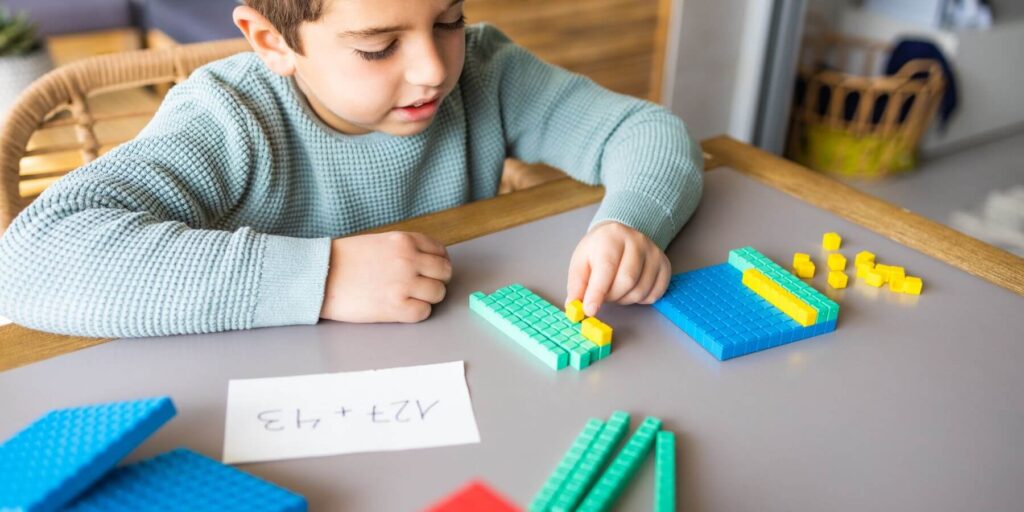
Have you noticed that your child loves numbers, puzzles, or spotting patterns? If so, you may have a budding logical/mathematical learner on your hands—what a wonderful discovery!
Homeschooling gives us the beautiful opportunity to celebrate our children’s unique strengths, and for a logical/mathematical learner, that means embracing their love of reasoning, problem-solving, and analytical thinking. In this post, we’ll explore ways to support your child’s natural abilities by diving into practical strategies, tailored resources, and nurturing approaches that will make their learning journey both enjoyable and meaningful.
Understanding Logical/Mathematical Intelligence
Logical/mathematical learners are natural-born problem solvers. These are the children who light up when they see a challenging equation, notice patterns in everyday life, or ask questions that require deep, logical thinking. It’s a wonderful gift, and when nurtured, it can lead to a lifelong passion for learning.
Here are a few common traits of these learners:
- A love for numbers and puzzles: Does your child love playing with numbers or solving complex puzzles? They might already be diving deep into the world of mathematics without realising it.
- Logical thinkers: These children have a knack for following sequences and understanding cause-and-effect relationships, always asking why and how things work.
- Pattern recognition: Whether it’s in nature, in a book, or during everyday activities, these learners easily spot patterns and connections that others might miss.
Recognising these traits in your child can be a game-changer, allowing you to tailor your homeschooling approach to suit their strengths and bring joy to their learning.
Where Logical/Mathematical Strengths Shine
Your child’s logical/mathematical intelligence can lead them to many exciting fields, including:
- Mathematics and Statistics
- Computer Science and Coding
- Physics and Natural Sciences
- Economics and Finance
- Information Technology and Data Analysis
Homeschooling allows you to nurture these interests in a way that traditional education often cannot—by creating personalised, engaging experiences that fuel their analytical mind.
The Benefits of Homeschooling Logical/Mathematical Learners
One of the greatest gifts homeschooling offers is the ability to tailor the experience to your child’s unique learning style. For logical/mathematical learners, this personalised approach can unlock their full potential.
Here’s how homeschooling can be especially beneficial:
- Customised learning pace: Your child can explore subjects deeply without being rushed through a standard curriculum. If they want to spend extra time on complex equations or dive into coding, you have the freedom to let them.
- Real-world application: Logical learners often thrive when they can see the real-world implications of what they’re learning. From measuring materials for a home project to solving practical problems using maths, there’s no shortage of ways to make learning relevant and exciting.
- Focused environment: Logical learners often need quiet, focused time to concentrate on challenging tasks. Homeschooling allows you to create an environment free from distractions, giving them the space to delve into complex problems and solutions.
Choosing the Right Curriculum and Resources
Selecting the right curriculum can make all the difference in your homeschooling experience. Here are some top picks that cater to logical/mathematical learners:
- Singapore Maths: Known for its focus on deep understanding and problem-solving, this curriculum is ideal for children who enjoy working through complex mathematical concepts.
- Beast Academy: This fun, comic-book style curriculum makes advanced maths engaging and accessible while challenging your child to think critically.
- Life of Fred: Set # 1, Set # 2, Set # 3 A whimsical maths series that teaches through storytelling, helping children understand how maths fits into real life.
You can also supplement with online platforms that cater to logical minds:
- Khan Academy: A fantastic resource with a wide array of maths and science courses, perfect for a self-paced approach.
- Brilliant.org: Interactive lessons that build critical thinking and problem-solving skills through engaging maths and science challenges.
- Code.org: Coding is a natural fit for logical learners, and this platform introduces the basics of computer science in a fun, accessible way.
In addition to curriculum, remember the value of hands-on tools like logical puzzles, coding games, and problem-solving challenges. These activities allow your child to use their mathematical and analytical skills in a playful, creative way.
Teaching Strategies to Support Your Learner
When homeschooling a logical/mathematical learner, it’s important to balance structure with flexibility. These strategies can help you create an environment where your child thrives:
- Structured lessons: Logical learners appreciate clear, step-by-step instructions. Use a systematic approach to lessons, guiding your child through problems in a way that feels logical and orderly to them.
- Hands-on experiences: Whether through science experiments, coding projects, or field trips to a local tech museum, make sure your child has plenty of opportunities to apply what they’re learning in a hands-on way.
- Visual aids: Graphs, charts, and models can make abstract concepts more concrete and easier to grasp. Logical learners often benefit from seeing the problem laid out visually.
Harnessing Technology for Learning
Technology can be a powerful tool for logical learners, allowing them to dive deeper into problem-solving and critical thinking. Here are a few tech resources that have made a big difference for us:
- Coding games: Platforms like Code.org turn coding into a fun, interactive experience, teaching essential skills while engaging your child’s logical mind.
- Maths apps: Apps like Mathway and Photomath offer step-by-step solutions to problems, helping your child understand the process behind the answers.
- Simulations: Websites like PhET provide interactive simulations in maths and science, bringing complex concepts to life in a dynamic, hands-on way.
Fostering Critical Thinking and Problem-Solving
Logical/mathematical learners are natural problem solvers, but they still need guidance to nurture these skills. Here are a few ways to encourage critical thinking in your homeschooling routine:
- Puzzles and games: Introduce logic puzzles, Rubik’s cubes, chess, or strategic board games that require careful planning and critical thinking.
- Project-based learning: Real-world projects, like building a simple software program or creating a business plan, allow your child to apply their logical skills in meaningful ways.
Encouraging a Growth Mindset
It’s important to teach your logical/mathematical learner that learning is a journey. Even though they may tackle complex problems, they also need to understand the value of persistence and resilience. Here are some ways to foster a growth mindset:
- Celebrate persistence: Let your child know that effort and persistence are key to mastering difficult concepts. Celebrate small victories and frame mistakes as opportunities to learn.
- Praise effort over ability: Instead of focusing on your child’s intelligence, focus on their hard work and problem-solving strategies. This encourages them to keep pushing through challenges.
Social and Emotional Growth
While logical learners often excel academically, they can sometimes struggle socially or emotionally. It’s essential to support their holistic growth:
- Clubs and groups: Encourage your child to join clubs that match their interests, like a chess club, robotics team, or maths circle. These activities not only stimulate their mind but also provide opportunities for social interaction.
- Balance: Help your child explore hobbies and activities outside of academics, promoting well-rounded development.
- Emotional support: Logical learners can be hard on themselves, especially when they don’t immediately grasp a concept. Offer reassurance, and remind them that mistakes are part of the learning process.
Conclusion
Homeschooling is a beautiful opportunity to tailor your child’s education to their strengths. For logical/mathematical learners, the personalised pace, focused environment, and real-world applications can unlock their full potential. With the right resources, strategies, and mindset, you’ll be able to create an enriching learning experience that nurtures not just their intellect but also their creativity and emotional well-being.
At The Magic Art of Homeschool, we’re here to support you on this journey. Click here and take a look at my helpful tools to support your homeschool.


